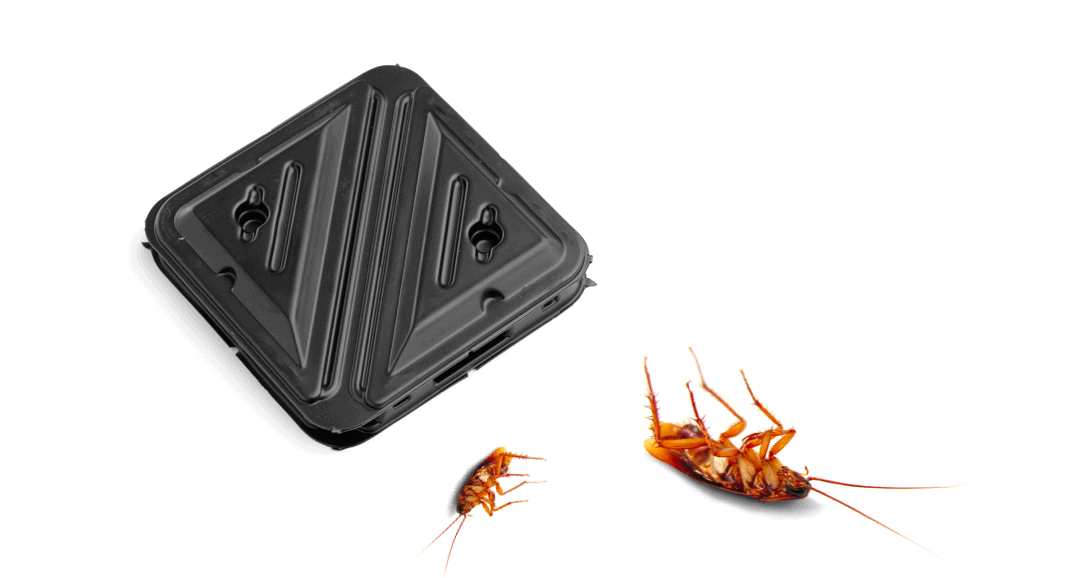My Dog Ate Combat Roach Bait
Roach bait is typically successful when it comes to exterminating its intended targets. But what about its non-intended targets… like your precious dog.
By now you may be asking, but what if my dog ate combat roach bait? That is a very good question.
If you own a dog, you know that most of the time they are sniffing around on the floor as they have a strong sense of smell. This is why roach bait seems to be so attracted to them.
Combat roach bait contains strong and harmful chemicals but is also mixed with enticing food that will make your dog want to eat it. This is not something new!
Dogs frequently eat roach bait that is lying around and most of them survive to tell the tale.
Roach bait like Maxforce, Raid, Hot Shot, or Fipronil is mixed with tasty ingredients like sugar and other appealing flavorings that cause your dog to consume it.
On the bright side, the roach bait itself is not particularly lethal to dogs. The products available on the market take pets like dogs into consideration.
Consequently, even though your dog may get poisoned from consuming large amounts of the bait, it is not always lethal.
The plastic casing that comes with the roach bait however is a different story. This can be very harmful to a dog so special care must be taken. If this happens your dog should be taken to seek medical assistance as soon as possible.
What Could Happen To My Dog If He Eats Combat Roach Bait?
As we’ve stated, the likelihood of your dog being poisoned by eating a bit of combat bait is very low.
If your dog eats the combat bait he will display symptoms like diarrhea, nausea, sudden vomiting and mild stomach irritation as these are the most common side effects.
One single combat bait is not enough to do damage to a dog of 10 pounds. The manufacturers of combat bait have given this assurance.
You will find this information on the packaging. A dog of 10 pounds will have to eat 50 trays of combat bait before they start experiencing serious effects.
But the amount in one tray is more than enough to get rid of a cockroach. This is good news for your dog, but it is still important that you try to prevent this from happening.

Sometimes your dog can be immune-compromised or have certain conditions that would make him susceptible to the poison.
Additionally, the poisons are not easily absorbed in a dog’s digestive tract. So approximately 95% of it will be excreted without harming them.
You can also look out for your dog being lethargic or urinating more than normal. Some dogs have seizures or trouble breathing.
What Could Happen To My Dog If He Eats The Roach Bait Plastic?
The plastic casing that houses the roach bait is actually more dangerous than the roach bait itself. Your dog will attempt to tear apart that plastic to access the roach bait that is flavored and designed to attract roaches.
He may accidentally ingest some of the plastic he has torn apart in his efforts to get to the roach bait.
These plastic pieces are a choking hazard because they are pointy and can do serious damage to internal organs especially the stomach and throat.
They can also get large along the digestive tract and choke your dog or cause an obstruction in the stomach.
Very small pieces may be passed in his stool but because dogs like to chew their food there may be large plastic pieces stuck inside him.
The plastic pieces that are ingested by your dog can also stop oxygen flow causing him to suffocate. He may stop breathing and even lose consciousness. This has very serious consequences here.
The choking can sometimes result in organ and brain damage or even death. Pieces of plastic that have made it to the esophagus and stomach may cause a condition called pyloric obstruction.
The plastic can cause your dog’s circulation to be cut off, leading to organ decay.
Take your dog to the vet as soon as you can if you have reason to believe that he has swallowed plastic see.
You could also look for symptoms such as loss of appetite, bloody stool, diarrhea, vomiting, lethargy, constipation, bloated stomach, and even heavy panting.
What Can I Do If My Dog Consumed Combat Roach Bait?

Because the combat roach bait is not poisonous enough to kill your dog, there is not much to do at this point.
You can induce vomiting if he has swallowed more than .45 oz per pound of his body weight. You still need to monitor his condition especially if he has other complications before he ate the roach bait.
On the other hand, if he has consumed the plastic the situation is more serious. It could be that he has only swallowed a small piece that he can pass in his stool but if he has swallowed larger and sharp pieces, then they could be lodged at any point in his gastrointestinal tract.
Any sort of stomach obstruction is quite serious so act fast to save his life. It is a better idea to take him to the veterinarian as soon as possible just to make sure that’s the situation is not serious. It is better to be safe than sorry.
What Should I Do If My Dog Is Choking?
There are certain steps that you must follow if you realize that your dog is suffocating due to the blockage. First, begin by attempting to remove the foreign objects as soon as possible.
This is assuming and that you can see them stuck in his throat, and you can pull them out with your fingers. Of course, this may not be always possible because your dog will undoubtedly struggle even though he is choking possibly to death.
If you are unable to see the foreign objects stuck inside him, then you should not attempt to shove your fingers down his throat as you may make the situation worse by pushing it down further.
The worst thing you can do is use another foreign object like scissors or a stick to pull the plastic out. You can injure his throat lining and cause serious damage.
The Heimlich maneuver may be more appropriate at this point to forcefully get him to cough up this plastic. If nothing else works then take him to the veterinarian as soon as possible for treatment.
What Type Of Treatment Does The Vet Usually Give?
Whenever a dog has ingested roach poison of any kind you should allow him to visit the veterinarian just in case.
Even if he has shown no symptoms of being sick you should seek medical attention because there may be underlying issues that you are unaware of.
If you are unable to take him to the veterinarian you can call Poison Control who will give you instructions about how you can treat him until you can see a vet.
You should never induce vomiting or give your dog medications that humans take to get him well. Only make these moves when you have sought some kind of medical attention.
When you are able to see the veterinarian he will do his best to get rid of the poison by using activated charcoal and giving your dog some intravenous fluid.
He may have to eat a special type of food along with vitamins that are not harsh on his kidneys.
You may have to perform some X-Ray to see if there are container pieces stuck inside him and where they are located. In some cases, he may have to perform surgery to rectify anything wrong.
Are There Any Alternatives To Combat Roach Bait?
Many people view combat roach bait to be unnecessary since dogs with their acute hearing and reflexes can hunt down roaches.
If you have a severe roach infestation you should look toward a non-toxic method to get rid of them. Make sure that you fill cracks or openings that roaches pass through.
You should also caulk around the pipes, cupboards, windows, doors, and outlets. A non-toxic alternative to roach bait is a mixture of 1 part table sugar to 1 part baking soda.
Leave this in places where the roaches may frequent, and it has the potential to exterminate them. Remember to cover all vents and large openings with a metal mesh screen.
What Should I Do If My Dog, If My Dog Has Internal Blockage?
You must assess and monitor your dog if you think for some reason that he has an internal blockage from eating the plastic around combat roach baits.
You can assist him for a few hours or days depending on his state of health. But if things get to be too much he should be rushed to the veterinarian as soon as possible.
If he has not shown any symptoms of obstruction then there are a few things that you should do. You can feed him a mashed potato a few slices of bread or just plain pumpkin paste.
This will form of cushion around the plastic pieces allowing him to harmlessly pass it in his stool leaving his GI tract free of internal lacerations.
Forcing your dog to vomit without knowing where the pieces may be stuck by using peroxide could be dangerous or even fatal.
He may regurgitate sharp pieces of plastic they could get stuck in other vital areas that can do more damage. It could also seriously hurt his esophagus lining.
Give your dog bland meals over the course of the next few days that consist of 75% cooked white rice and 25% lean meat that is boiled.
This is one of the easiest diets to digest so that his bowel movements will progress faster thereby eliminating the pieces of plastic.
If you can monitor his stool for the pieces of plastic but if you notice any of the tell-tale signs of poison or blockage don’t try to handle it on your own seek medical help.
What Are The Ingredients Of Combat Roach Bait?

Your average combats roach bait will contain one of two poisons which are: Hydramethylnon 2% or Fipronil 0.05%.
The rest of the roach bait consists of non-toxic ingredients like flavorings, preservatives, and sugar. The toxic ingredients however are safe around dogs for the most part.
Fipronil 0.05% – this is also placed in tick and flea treatment for dogs which is a testament to its safety. It is harmful to insects because it’s overexcites the central nervous system by attacking the nerve cells.
It is more potent than hydramethylnon as it can kill roaches in about 6 to 24 hours. Even though it is lethal to insects it is less toxic to mammals such as cats and dogs who handle the poison quite well.
Studies have shown that it can cause your dog to have convulsions, tremors, seizures, muscle cramps, hyperactivity, and loss of balance.
Hydrametlhylnon 2% – This insecticide works a bit slower, as it can kill cockroaches in around 2 to 4 days after its consumption.
This is actually strategic as the cockroaches can survive and go back to their colony and transmit the poison to other roaches. Hydramethylnon stops energy production in insect cells which caused them to have a loss of appetite and lethargy.
It is also not very harmful to your dog when they have not consumed enough of it. Studies done on rats show that hydramethylnon can cause loss of balance, decrease in appetite and physical activity.
What Can You Do To Keep Your Do Safe?
There are a number of things you can do to make sure that your dog is safe from eating combat roach bait.
Make sure that the roach bait is placed in areas where your dog is unable to reach them even if he smells and goes after it.
Some dogs may use their paws to drag it out from hidden places. Ensure that you have your vet on speed dial along with hydrogen peroxide just in case you call your vet, and he has instructed you to induce vomiting.
Also, make sure that the package of the combat roach bait is available so that you can be aware of the name of the chemicals that he ingested.
Additionally, if you have leftover roach bait do not leave it in places where your dog can find it like on the floor where he can smell it.
Keep the trap stored away carefully in places where your dogs cannot reach. The most important thing to do here is cut off your dog’s access from reaching the roach baits in the first place. Prevention is better than cure.
Final words
If your dog ate combat roach bait, you don’t usually need to stress out about the poison. Combat roach bait is unlikely to harm your dog, but the plastic housing is a different story so make sure that he does not get this at all.
Both poisons used are for the most part not harmful, especially when ingested in small amounts.
When your dog is choking from anything and for any reason, it is always a cause for concern and a reason to reach out to your veterinarian.






